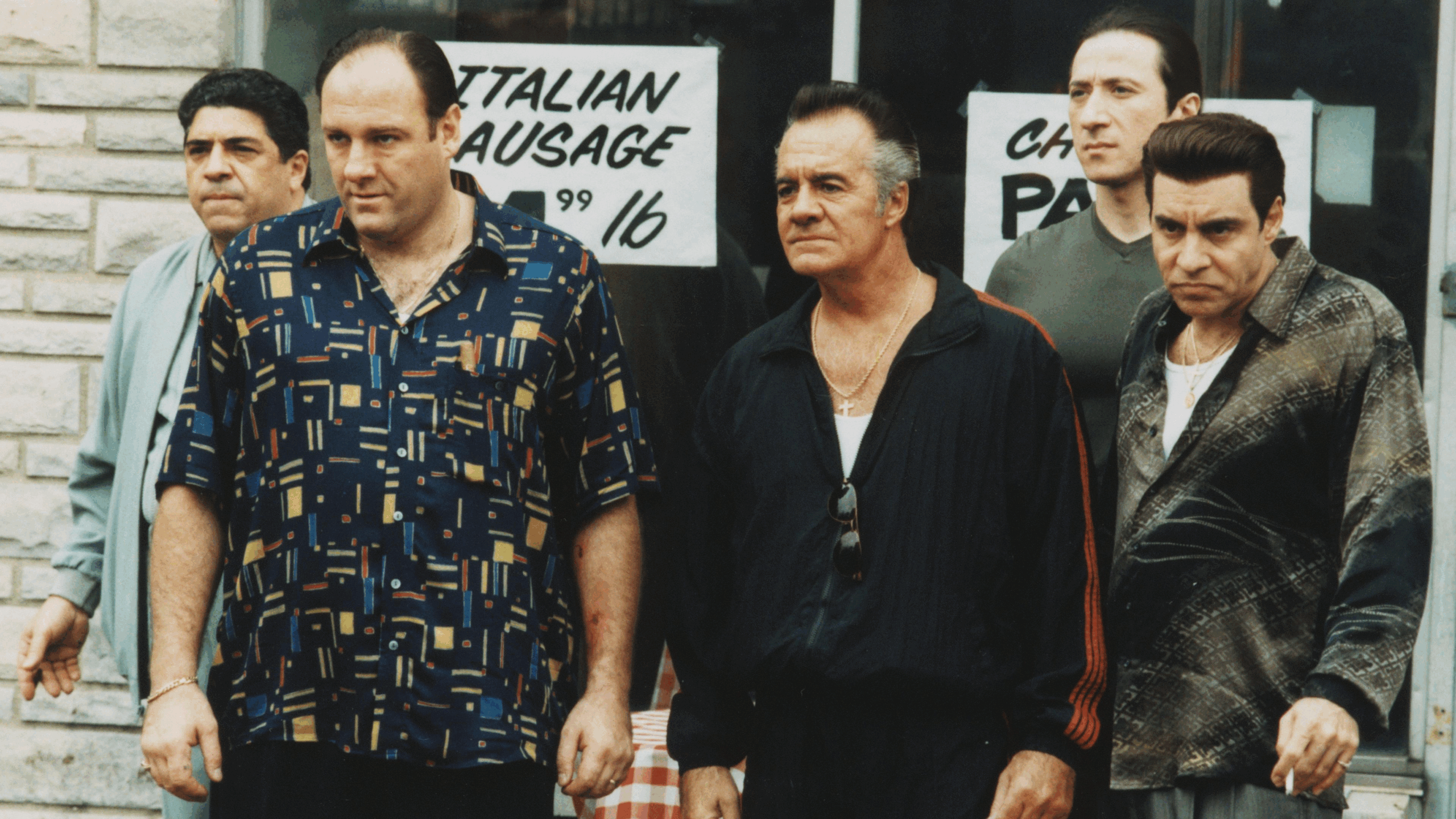
Season 4 of The Sopranos is the quiet storm before the cultural and moral implosion. It dials down the mob action and raises the stakes on the home front. This is the season where marriage becomes war, loyalty means compromise, and money is the silent killer in both Tony’s business and his personal life. It’s no longer just about whacking enemies or navigating mob politics — The Sopranos now becomes a brutal dissection of domestic decay, capitalism, and emotional rot.
A Marriage on the Brink: Carmela vs. Tony
If Season 3 showed Carmela beginning to question her choices, Season 4 shows her reaching the breaking point.
Her marriage to Tony, already fraying from years of infidelity and emotional neglect, hits new lows. Tony continues to cheat — now with Valentina, a beautiful but equally cynical woman who knows the score. Carmela, no longer in denial, doesn’t just suspect infidelity — she knows. And it’s killing her slowly.
Money becomes the battleground.
Carmela wants financial security for herself and the kids. Tony refuses to give her any real power. He’s willing to spend on mistresses and luxuries, but he won’t hand Carmela anything that could make her independent. Their arguments, particularly in the episodes “The Strong, Silent Type” and “Whitecaps,” are among the rawest in TV history.
By the season’s end, after years of humiliation and emotional starvation, Carmela throws Tony out of the house.
It’s not just a marital fight. It’s a declaration of war.
“Whitecaps”: The Greatest Argument in Television
The season finale, “Whitecaps,” is a tour de force of acting and writing. James Gandolfini and Edie Falco turn their characters’ unraveling into something Shakespearean. What begins as a disagreement over buying a beach house spirals into a full-blown dissection of 20 years of lies, rage, and regret.
Tony screams. Carmela weeps. They both weaponize past wounds. And perhaps for the first time in the series, they stop playing the roles they’ve created — mob boss and loyal wife — and become simply: two ruined people in a collapsing marriage.
“Whitecaps” isn’t just an episode. It’s a cultural moment. It redefined what TV could do with emotional conflict.
The Business of Blood: Johnny Sack and the New York Problem
Season 4 further expands the interstate tensions between New Jersey and New York. Johnny Sack begins to emerge as a serious player — intelligent, calculating, and easily offended. His conflict with Ralph Cifaretto over a joke about his wife’s weight escalates into a near mob war.
Tony tries to prevent bloodshed, but this isn’t just about honor — it’s about economics and control.
New York is watching Tony. Testing him. And Johnny Sack’s quiet ambition sets the stage for the growing threat that New York will pose in the seasons to come.

Ralph Cifaretto’s Downfall: Horseplay Turns to Homicide
If Ralphie was volatile in Season 3, he becomes radioactive in Season 4. He seems to settle into a profitable routine, especially after his prized racehorse, Pie-O-My, starts winning races. Tony becomes emotionally attached to the horse — a symbol of purity and hope in a corrupt world.
And then Ralph kills it. Or at least, Tony believes he does.
In one of the most shocking and quietly brutal scenes of the series, Tony beats Ralph to death in his kitchen. Not over a business deal. Not over betrayal. But because Tony feels something for the horse, and Ralph — who also once beat a stripper to death — is incapable of empathy.
It’s a pivotal moment. Tony’s rage is no longer calculated. It’s emotional. He kills not as a boss, but as a man who can no longer control the storm inside.
Christopher’s Spiral: Heroin, Violence, and Isolation
Christopher Moltisanti, once positioned as Tony’s heir apparent, falls deeper into drug addiction. His heroin use becomes public, and his increasingly erratic behavior alienates him from the crew and Adriana.
Tony stages an intervention — one of the darkest comedic scenes in the show — and it ends in a fistfight. It’s both hilarious and horrifying, showing how ill-equipped these men are to deal with emotional or psychological issues.
Christopher does go to rehab, but his soul remains fractured. And worse, he’s vulnerable. The Feds see this. So does Tony.
The dream of succession is fading.
Adriana and the FBI: The Net Tightens
Adriana, desperate and terrified, is forced into becoming an FBI informant. Her story becomes one of the most tragic in the entire series. She’s in love with a man who can’t save her. She’s being used by a system that doesn’t care if she lives or dies.
The scenes between her and her FBI handler are quietly devastating. Adriana doesn’t have the savvy or ruthlessness to navigate this world. She’s in way over her head, and the pressure is starting to show.
Every lie she tells Christopher. Every secret she keeps. It’s all leading somewhere dark.
Dr. Melfi and the Boundaries of Empathy
Tony’s therapy with Dr. Melfi becomes less about progress and more about management. He uses their sessions to justify behavior, to control rage, to feel momentarily human. But the breakthroughs are fewer now. Melfi grows increasingly concerned that she’s enabling him.
Their sessions in Season 4 often turn into passive-aggressive battles. Melfi tries to make Tony see the moral cost of his choices, but he always deflects. Always rationalizes.
Still, he keeps coming back — and so does she. Because there’s something mutual here. Something neither of them can fully articulate.
Capitalism and the American Dream, Soprano-Style
Season 4 dives deeper than ever into the themes of capitalism and greed. Tony isn’t just a mobster. He’s a businessman. Real estate deals, construction scams, and credit card fraud become as important as any hit.
Everyone is chasing something they think will finally satisfy them — a house, a horse, a new relationship, more money. But no one is ever fulfilled. Every deal ends in bitterness. Every acquisition brings more emptiness.
The American Dream, in the world of The Sopranos, is a rigged game. And everyone’s still playing.
Season 4 is a slow burn — less explosive, more existential. But its emotional weight is staggering. The collapse of Tony and Carmela’s marriage, the growing threat from New York, and the internal unraveling of the crew make this season one of the show’s most mature and thematically rich.
It’s the season where we stop asking whether Tony can be redeemed.
And we start wondering how much lower he can fall.
